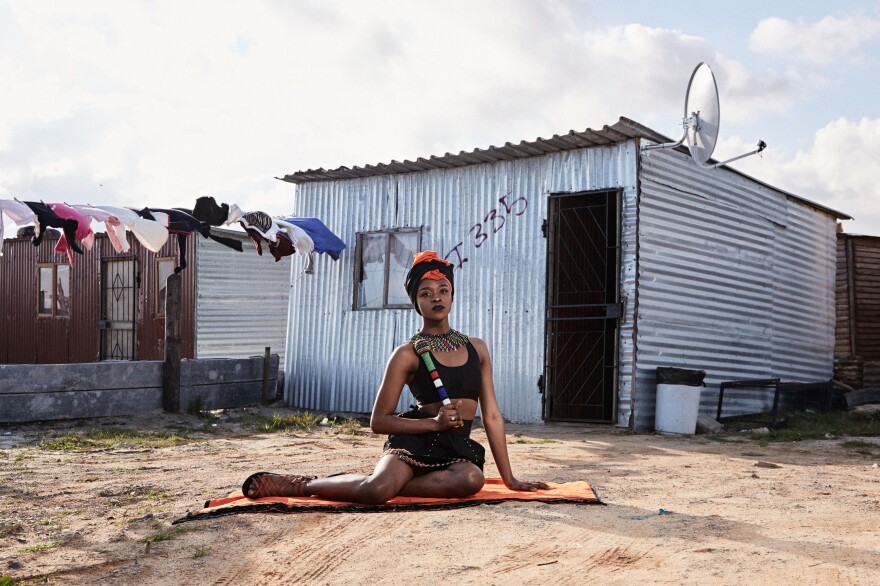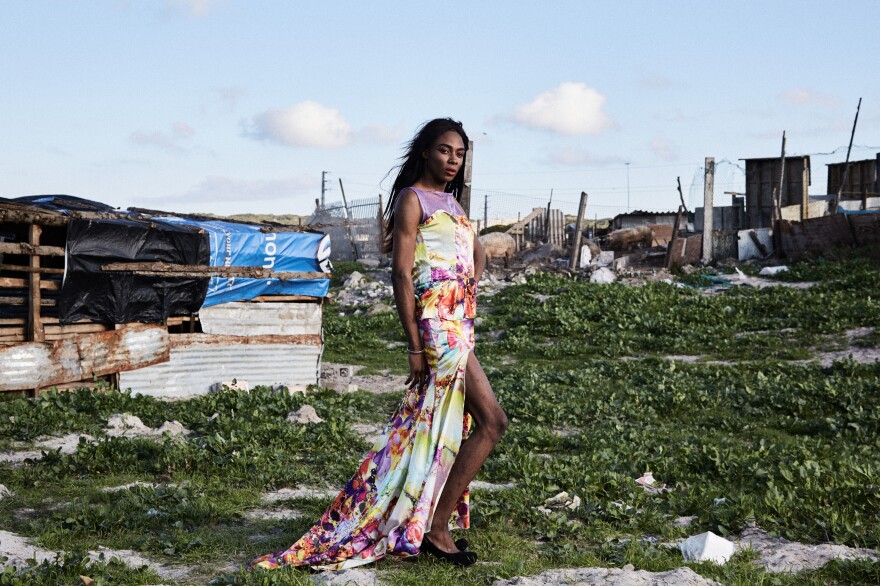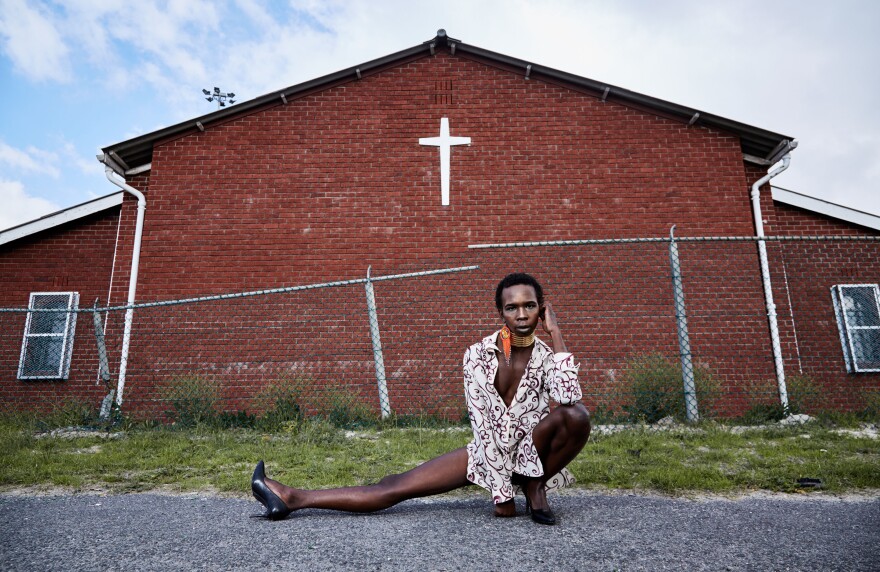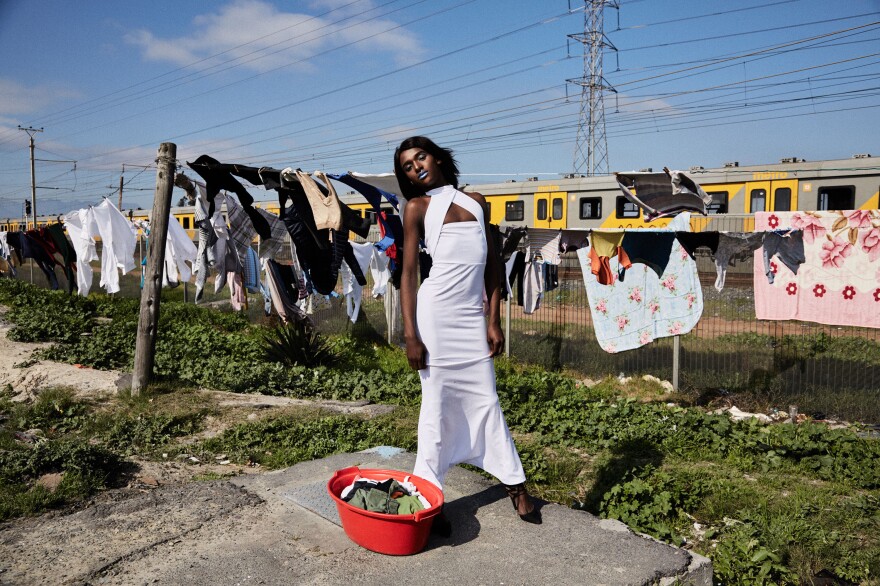When Belinda Qaqamba Ka-Fassie dresses in drag, she doesn't typically go for the sequins and feather boas worn by performers on RuPaul's Drag Race. A post-graduate student of education at Stellenbosch University in Cape Town, South Africa, Ka-Fassie might put on a dress that resembles the white blanket typically worn by boys at a traditional male circumcision ritual, called ulwaluko, and she might add a multi-colored headpiece and beaded stick, both handmade and used by brides.
It's a very deliberate choice made by black drag queens from townships who are celebrating their roots and challenging dress codes for men and women through their traditional apparel. "We cannot separate our queerness from our Xhosaness," says Ka-Fassie, a drag queen and activist.

Yet even as they embrace their culture, township drag queens outside of Cape Town, as in other parts of the world, face grave risks. They must often suppress their queer identity in their communities for their safety — traveling into the city for pageants and parties, then de-dragging before they go home.
The limbo they live exists even in the terminology for their identity. There is no word to describe queerness in Xhosa, the indigenous language widely spoken in South Africa. The words that do exist are often insulting to the queer community, describing sexual behavior and denying queer people dignity. "When I came out to my family, I couldn't find the appropriate word in Xhosa to explain my queerness," Ka-Fassie says.
#BlackDragMagic is the name of a photo project in collaboration with Ka-Fassie – a series of portraits showing how drag can be an art form in Africa that differs from mainstream aesthetics in the West.
All of the portraits were taken on a single afternoon in August, with a pickup truck serving as a makeup station and changing room. The subjects — queer, black, gender-nonconforming and trans — were photographed throughout the township of Khayelitsha, which means "new home" in Xhosa. The township is located on the Cape Flats, about 15 miles southeast of Cape Town.

The girls walked down the streets that day in a group, proudly and unapologetically. "I carry my African-ness and my queerness on my sleeve because it is who I am," says Mandisi Dolle Phika, one of the photo subjects.

Discrimination is a part of everyday life for queer people in the townships, especially at taxi stands, churches and schools. In the Western Cape alone, a 2016 survey of 112 LGBT participants age 16 to 24 by Love Not Hate, a national campaign addressing anti-gay hate crimes, found that about two-thirds of LGBT people between the ages of 16 to 24 reported experiencing discrimination at school. Reliable statistics are rare, because queer people in townships often choose not to report harassment or violence out of fears for their safety and distrust of local law enforcement.
![Unathi Ferguson, left, was outed by a teacher in 11th grade but eventually saw the moment as a chance to "embark on a journey to sanity and complete acceptance [about] who I was." Shakira Mabika, right, emigrated from Zimbabwe to South Africa in 2013. Olwage says the women told her they had forged "a newfound sisterhood."](https://npr.brightspotcdn.com/dims4/default/20c66eb/2147483647/strip/true/crop/3000x1998+0+0/resize/880x586!/quality/90/?url=https%3A%2F%2Fmedia.npr.org%2Fassets%2Fimg%2F2019%2F09%2F20%2Fferguson_mabika-1_custom-e029fb9786d68386683090c1fcd33d308b9ac407.jpg)
Black queer people here, as in many other parts of the world, also struggle to be understood by their health care system. Some studies have found that LGBT patients have been subjected to discrimination, with health care providers refusing them care or doling out moral judgment. Long lines of people waiting for free treatment at clinics or state hospitals in impoverished areas can lead to a lack of privacy for patients. As a result, many avoid medical care or receive poor care.
But the picture doesn't have to be bleak. "Living in a township has taught me to be strong and strive. I have dealt with the stigma and hate, and now am stronger," said Liyana Arianna Madikizela, a 17-year-old who posed for photographs.

Madikizela embodies the strength and resilience the drag queens have shown in the face of injustice and oppression. "I want to become the role model I never saw in the streets of Kayamandi," she said. "Someone who is unapologetically gender non-conforming and who navigates their lives against all the hostile odds of living in the township."
Lee-Ann Olwage is a South Africa-based photographer. Sasha Ingber is a multimedia journalist based in Washington, D.C. Belinda Qaqamba Ka-Fassie, a drag artist and advocate, collaborated with Olwage on this project.
Copyright 2023 NPR. To see more, visit https://www.npr.org.



